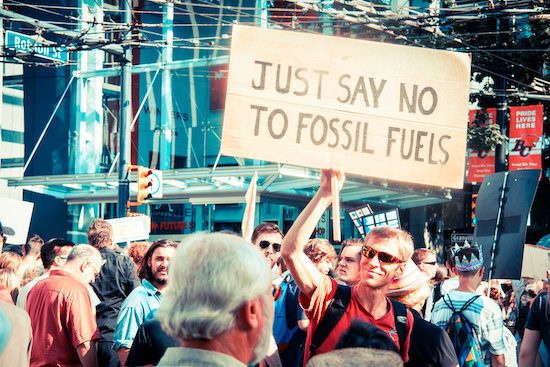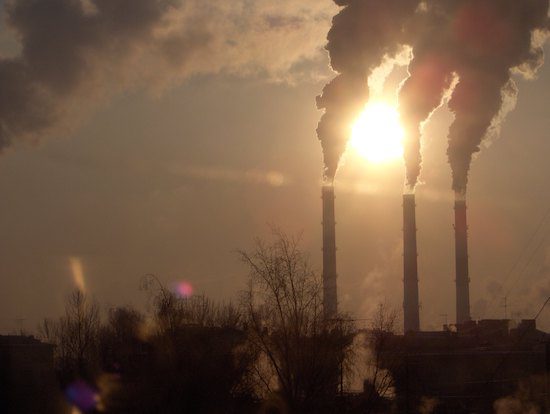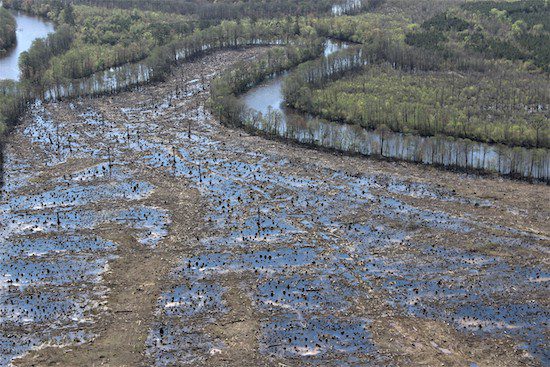


By Reynard Loki, Independent Media Institute
7 min read
World governments continue to prop up the fossil fuel industry with astronomical amounts of cash: in excess of $5 trillion every single year, according to a 2019 paper published by the International Monetary Fund. If we want to avoid climate catastrophe and quickly move society to a low-carbon future, propping up the fossil fuel industry is exactly the wrong strategy, as subsidies reinforce bad behavior: continued production, usage and reliance on dirty fuel.
“That’s enough money to buy Apple,” said Mark Todd of Fauna & Flora International (FFI), in a recent email. “It’s enough to buy Google as well. It’s enough to also buy Coca Cola and McDonald’s and Unilever and Walmart and JP Morgan and Nike and Disney and still have a tidy hundred billion or so left over. It’s enough to buy every single item, product and service that the U.K. produces in a year. Almost twice.”
“We need countries around the planet to get their priorities straight, and that’s why we’re calling on global governments to redirect some of that commitment—instead using it to protect nature,” said Todd. “That’s the only way we’ll escape this crisis.” FFI has launched a public petition calling on world governments to commit an initial $500 billion to protect nature, with that amount increasing every year.
Proponents of oil and gas can argue that the subsidies are necessary as oil plummets to decades-low prices. By several measures—the fossil fuel industry is on its back foot. Cheaper renewable technologies and the implementation of more forceful governmental policies since the mid-2000s have steadily disrupted its economic grip. The trend has only been accelerated by the sudden drop in usage spurred by the lockdowns and travel restrictions imposed during the COVID-19 pandemic. The title of a recent brief by the International Energy Agency puts the current situation in stark terms: “The global oil industry is experiencing a shock like no other in its history.”
But while ExxonMobil’s earnings plunged by more than 30 percent last year, the world’s largest oil company still generated $46.2 billion in revenue in the third quarter this year. “We remain confident in our long-term strategy and the fundamentals of our business, and are taking the necessary actions to preserve value while protecting the balance sheet and dividend,” said Exxon’s chairman and CEO Darren Woods after the company reported third-quarter results in October. But does the company and the industry as a whole still need a massive taxpayer handout when we are in the midst of a climate crisis—and when most Americans want to address it by reducing our use of dirty fuel? Six out of 10 Americans—including 80 percent of Democrats and 37 percent of Republicans—say they would favor policies that would reduce emissions to address climate change, according to a Gallup poll last year.
“Where [subsidies] are given to producers, they protect inefficiency in sunset industries which needs to [be] phased out as a matter of urgency to avoid the escalating the climate emergency, and where they are directed to consumers to alleviate energy poverty, they tend to be poorly targeted, mainly benefitting wealthier households,” argue Ian Mitchell and Lee Robinson, policy analysts at the Center for Global Development, a nonprofit think tank based in Washington, D.C.
In a 2019 paper, the International Monetary Fund (IMF) calculated that national fossil fuel subsidies—including direct and indirect financial support for coal, oil and gas—hit $649 billion in 2015. To put that gargantuan figure into perspective, Pentagon spending was $599 billion that same year. But this massive spending is hiding in plain sight. “These subsidies are largely invisible to the public, and don’t appear in national budgets,” writes Tim Dickinson for Rolling Stone.
“Oil, gas and coal companies—and their stooges in public office—have long argued that making consumers pay for the full impacts of fossil fuel use would cripple the economy,” reports Dickinson. “The IMF experts call bullshit on this idea, revealing that the world would, in fact, be more prosperous.” The study found that eliminating subsidies for fossil fuels would have created global “net economic welfare gains” in 2015 of “more than $1.3 trillion, or 1.7 percent of global GDP.” If global fossil fuel subsidies were eliminated, IMF explained, worldwide air pollution-related deaths would almost be halved, while total carbon emissions would fall by nearly 30 percent.
Only China spends more on propping up dirty fuel than the U.S—and on both of these fronts, President-elect Joe Biden wants things to change. His $2-trillion climate plan will be paid for in part by ending fossil fuel subsidies and states that “future bilateral U.S.-China agreements on carbon mitigation … [will be] contingent on China eliminating unjustified export subsidies for coal.” The president-elect remains “steadfast” in his commitment to demand a worldwide ban on fossil fuel subsidies and eliminating them in the United States “during the first year of his presidency,” said Stef Feldman, policy director for the Biden campaign.
But the incoming president is set to face some stiff opposition on this policy in Congress—even from some members of his own party. Gilbert Metcalf, a former deputy assistant secretary for environment and energy at the Treasury Department under President Barack Obama, said that any standalone bill seeking to eliminate tax breaks for the oil and gas industry would be “dead on arrival in the Senate” if the Republicans maintain control of the upper chamber. “[E]ven with a commanding Democratic majority in the Senate in Obama’s first six years in office,” points out Reuters’ Timothy Gardner, “the former president was unable to kill the subsidies.”
“The best climate science says that we have perhaps ten years left to prevent catastrophic damage, including extreme heat, floods, drought, and poverty,” writes Earth | Food | Life contributor David Hastings, a climate scientist. “Candidate Biden seemed to understand both the urgency and the opportunity in the climate crisis. Now it is up to President Biden to deliver. Much is at stake.”
- Sign the petition calling on world governments to commit an initial $500 billion to protect nature, with that amount increasing every year.
Cause for concern…

United Nations Secretary-General Antonio Guterres addressed the growing threat of the climate crisis in a speech last week on the state of the planet at Columbia University in New York, reports Stuart Braun for Deutsche Welle. “The state of the planet is broken, humanity is waging war on nature,” Guterres said. “Nature always strikes back, and is doing so with gathering force and fury.”
- UN chief Antonio Guterres: ‘There’s no vaccine for the planet’ (Stuart Braun, Deutsche Welle)
- Countries fall short of UN pledge to protect 10% of the ocean by 2020 (Chris Arsenault, Mongabay)
- Not waiting for public comment, Trump admin schedules oil lease sale for Arctic National Wildlife Refuge (Sabrina Shankman, InsideClimate News)
- Global soils underpin life but future looks ‘bleak,’ warns UN report (Damian Carrington, The Guardian)
- Residents kept in dark about storm risks to Louisiana’s chemical plants (Sara Sneath, WWNO and Southerly)
Round of applause…

“The time is right to harness the power of international criminal law to protect our global environment,” said Prof. Philippe Sands QC, of University College London, who co-chairs a new initiative to make ecocide—the destruction of the world’s ecosystems—a legally enforceable crime. “My hope is that this group will be able to … forge a definition that is practical, effective and sustainable, and that might attract support to allow an amendment to the [International Criminal Court] statute to be made.”
- International lawyers draft plan to criminalize ecosystem destruction (Owen Bowcott, The Guardian)
- Britain plans to ban live animal exports for slaughter after Brexit (AFP via Free Malaysia Today)
- Tel Aviv’s 3D-printed vegan meat brand goes public, raises $13 million (Nicole Axworthy, VegNews)
- This new vegan ham has hundreds of people on the waiting list (Charlotte Pointing, LIVEKINDLY)
- You can make these vegan holiday cookies with just 5 ingredients (Megan Falk, Shape Magazine)
Parting thought…

“It is curious—curious that physical courage should be so common in the world, and moral courage so rare.” —Mark Twain
Earth | Food | Life (EFL) explores the critical and often interconnected issues facing the climate/environment, food/agriculture and nature/animal rights, and champions action; specifically, how responsible citizens, voters and consumers can help put society on an ethical path of sustainability that respects the rights of all species who call this planet home. EFL emphasizes the idea that everything is connected, so every decision matters.
Click here to support the work of EFL and the Independent Media Institute.
Questions, comments, suggestions, submissions? Contact EFL editor Reynard Loki at [email protected]. Follow EFL on Twitter @EarthFoodLife.